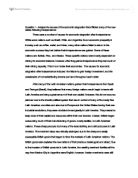Democracy in Latin America
E.B. Bradford Burns believes that democracy was a very ineffective and fragile model of government within Latin America, with a “scant capacity” to develop and modernize Latin America and alter past traditions. In the early 1960s to late 1970s, the disillusionment about democracy resulted in many military rulers placing the blame on democracy for the wrongs within a country. According to Josue de Castro, in his book “Death in the Northwest”, democracy had only served to preserve “abstract principles and existing systems of advantage”, yet did not provide even the most basic reforms. In Guatemala, the failures of democracy to solve national problems embittered youth, resulting in the formation of Guatemalan guerrillas that favored extreme socialist revolutions and refused to participate in any democratic elections. In Colombia, between 1930-1931, agrarian reforms, as well as nationalization of national resources, expropriation of all estates,
popular government as well as high wages for workers were demanded. In the Dominican Republic, Liberal Democrat Juan Bosch advocated for a democratic form of government, becoming president in 1962 after the assassination of General Rafeal Trujillo, but was later overthrown by the military. The oligarchy as well, had confused views about democracy and communism, often associating them to be similar concepts. As a result, Bosch concluded that representative democracy cannot work because it maintained the privileges of the minority possessing wealth, but did not provide the stability, personal safety, education and health care systems desired by the majority. Democracy ...
This is a preview of the whole essay
popular government as well as high wages for workers were demanded. In the Dominican Republic, Liberal Democrat Juan Bosch advocated for a democratic form of government, becoming president in 1962 after the assassination of General Rafeal Trujillo, but was later overthrown by the military. The oligarchy as well, had confused views about democracy and communism, often associating them to be similar concepts. As a result, Bosch concluded that representative democracy cannot work because it maintained the privileges of the minority possessing wealth, but did not provide the stability, personal safety, education and health care systems desired by the majority. Democracy was a fundamentally unjust sociopolitical system that has been a failure for more than 150 years, maintaining the principal that men have the right to exploit and be exploited. Bosche proposed leadership under a radical populist government that can reform the landowning structure, diversify economy, as well as industrialize and nationalize all large companies. This was a prevalent pattern in all Latin American governments – the desire for economical development, independence, agrarian reform, state ownership of natural resources, popular government and the valuation of the individual. From 1975, ¾ of all Latin American governments were controlled by dictatorships. In order for democracy to succeed, the middle class was needed to bring change to society. However, the middle class was more committed to economic wellbeing than democratic theory and practice, for they feared change, choosing to abandon democratic processes when conditions became no longer favorable and large portions of the populations started to participate in democratic affairs. One prevailing trend was that the middle class would urge the military to intervene, reinstituting a government favorable to the bourgeois, as in the case of Brazil in 1964. In Uruguay, which was considered middle class paradise of reforms and democracy due to the reforms under the leadership of Jose Batlle, crumpled when the economy crumpled, resulting in the worst inflation and poorest economical performance in all of Latin American between 1955-1970. Land monopoly, the overdependence of export, inefficient use of land, and low agricultural production all contributed to this. The classes that suffered the most responded, forming the “Movement for National Liberation” (Tupamaros) in 1960, which became a national force by 1968, advocating for reform, socialization of industry, expropriation of foreign banks, businesses and industries. The new Uruguay government used military force to maintain order due to the request of the middle and upper classes, jailing the highest number of political prisoners per capita. Uruguay, once the model of democracy and reform, resulted in a dictatorship “devoid of freedom, reform and hope”. In Chile, the middle class advocated for democracy in 1973. President Salvador Allende’s government, Popular Unity, aimed to form a socialist and independent society within democratic and constitutional framework of the nation, yet were opposed by transnational companies, United States, the military, the middle class and traditional elites. Economic tensions resulted when international banks cut off loans and the middle class striked, urging the military to intervene. On September 11, 1973, the presidential palace was bombed and Allende died, resulting in the military establishing dictatorship, murdering thousands of Chileans, abolishing liberties, increased the work week and the end of all of Allende’s reforms. In conclusion, Burns believes that within the structure of Latin America, democracy was not only fragile, but also ineffectual, lacking the capacity to develop and modernize Latin America. The middle class had no commitment to democracy or change, stating the reforms within democracy presented but an “idealist” view of things. According to Burns, there is no evidence to suggest that democracy was able to bring in the basic reforms so need by Latin America, sustaining Juan Bosche’s point that only a popular dictatorship would be able to bring along change. Burns concludes by stating that democracy only “serves as a guise to preserve the status quo”.







